Politicians have a “national duty and responsibility” to attend official ceremonies at military cemeteries on Remembrance Day next week, but they must be extra sensitive to bereaved families in the current period of social upheaval to avoid commotions, National Unity chairman Benny Gantz said Wednesday.
His comments came in response to a large group of bereaved families’ repeated requests over the past few days that politicians stay away from military ceremonies this year and Defense Minister Yoav Gallant's rejection of their request on Tuesday.
“We must show extra sensitivity this year and maintain respectful dialogue that honors the memory of the fallen [soldiers], and only it, [and] to attempt to attend, coalition alongside opposition, to show that we are all unified on this day,” Gantz said.
“I respect the bereaved families who criticize us,” he said. “I accept everything they say with love and embrace them. Each and every one of them has a place in all of our hearts. Nonetheless, we all need to enter the [military] cemeteries with personal and national grief and leave the public dispute aside, if only for one day.”
Opposition to ministers who didn't serve
Many bereaved families are against having government ministers or MKs who did not serve in the IDF participate in the ceremonies, according to Eli Ben-Shem, the CEO of Yad Labanim, an organization that commemorates the memory of fallen soldiers and cares for their families.

Out of 52 memorial ceremonies at military cemeteries, seven were scheduled to include ministers or MKs who did not serve in the IDF, including National Security Minister Itamar Ben-Gvir, who is scheduled to speak in Beersheba, he told KAN News on Wednesday.
The Defense Ministry said the arrangements were not final, Ben-Shem said. He expressed hope that the ministry would make changes to avoid friction as much as possible.
Ben-Shem and about 30 other members of the Public Council for Commemorating Soldiers, which advises the defense minister on the issue, met with Gallant on Tuesday. They expressed their concern that politicians’ speeches would be disrupted by bereaved families who oppose the government’s proposed judicial reforms.
Gallant said politicians should attend the ceremonies because elected officials were a symbol. The demand to remove them from cemeteries was equivalent to a demand to remove the flag, he said.
The Shin Bet (Israel Security Agency) is arranging security for the politicians based on how much opposition they are expected to face from bereaved families, KAN reported Wednesday.
The umbrella movement of protest organizations against the judicial reforms on Tuesday said it was not planning on staging protests on Remembrance Day.
An unaffiliated group of bereaved families named “With Their Death They Commanded” – short for the phrase “with their death they commanded us life,” but also of the altered phrase “with their death they commanded us democracy,” which group members displayed on their signs at protests – said rejecting their requests would force them to make a “vicious choice: Shout, avoid [the cemetery], or be a captive audience for politicians, some of whom did not serve in the army and who routinely spread hate, incitement and divisiveness.”
A different group of bereaved parents named Bochrim Bachayim (Choosing Life), which is not connected to the judicial reform, proposed earlier this week that politicians should attend ceremonies in pairs, one from the coalition and one from the opposition.
Brothers in Arms, a prominent protest group of IDF reservists, issued a statement that called on people to “maintain the sanctity of Remembrance Day.”
“The open wound of our brothers and sisters who lost loved ones will never heal,” the statement said. “On this Remembrance Day, we will not protest because our hearts will be with our brothers and sisters in arms who fell in battle. We will bow our heads in their honor, cry and embrace the families. We call on all the brothers and sisters in arms to leave their protest shirts at home and not to come with them to the cemetery.”
Commanders for Israel’s Security, a movement of former senior security officers, called on politicians not to attend the ceremonies.
“We, members of Commanders for Israel’s Security, whose best friends and soldiers are buried at the military cemeteries throughout the country, call on the politicians to leave the deep disagreements in the nation outside of the Remembrance Day events,” it wrote on Twitter. “No person has the right to damage the memory of the fallen or add to the pain of the families. We call on ministers and MKs not to force themselves on families and not to appear at the ceremonies and memorials.”
